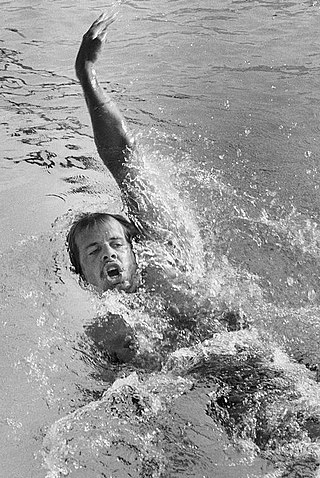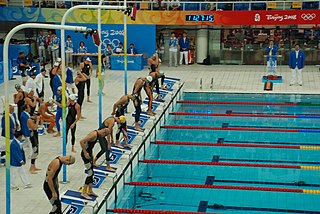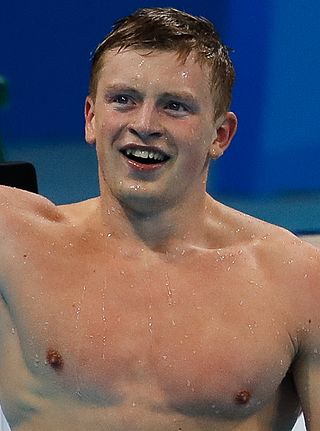Medley is a combination of four different swimming styles—backstroke, breaststroke, butterfly, and freestyle—into one race. This race is either swum by one swimmer as individual medley (IM) or by four swimmers as a medley relay.

The men's 200 metre backstroke event for the 1976 Summer Olympics was held in Montreal. The event took place on 24 July. There were 33 competitors from 23 nations, with each nation having up to 3 swimmers. The event was won by John Naber of the United States in world-record time; he was the first person to swim the event in under 2 minutes (1:59.19). It was Naber's fifth medal of the Games: completing a double in the backstroke events as well as golds in the medley relay and the 4×200 free relay, along with a silver in the 200 free. It was the second American victory and second American medal sweep in the men's 200 metre backstroke, after 1968; of the 12 medals from 1968 through 1976, 10 were won by Americans and the other two by Roland Matthes. Peter Rocca (silver) and Dan Harrigan (bronze) were the other two Americans, along with Naber, to reach the podium in 1976. The rules changed in 1984 to limit nations to two swimmers each, preventing further sweeps.
Ian Lovett O'Brien is an Australian breaststroke swimmer of the 1960s who won the 200 metre breaststroke at the 1964 Summer Olympics in Tokyo in world record time. He won five Commonwealth Games gold medals and claimed a total of nine individual and six relay titles at the Australian Championships, before retiring at the age of 21 due to financial pressures.
This article includes the world record progression for the 4×100 metres medley relay, and it shows the chronological history of world record times in that competitive swimming event. The 4×100 metres medley relay is a medley race in which each of four swimmers on a team swims a 100-metre leg of the relay, each swimming a different stroke, in the following sequence:
- Backstroke ;
- Breaststroke;
- Butterfly;
- Freestyle.

Swimming is an individual or team racing sport that requires the use of one's entire body to move through water. The sport takes place in pools or open water. Competitive swimming is one of the most popular Olympic sports, with varied distance events in butterfly, backstroke, breaststroke, freestyle, and individual medley. In addition to these individual events, four swimmers can take part in either a freestyle or medley relay. A medley relay consists of four swimmers who will each swim a different stroke, ordered as backstroke, breaststroke, butterfly and freestyle.

Freestyle is a category of swimming competition, defined by the rules of the International Swimming Federation (FINA), in which competitors are subject to a few limited restrictions on their swimming stroke. Freestyle races are the most common of all swimming competitions, with distances beginning with 50 meters and reaching 1,500 meters, also known as the mile. The term 'freestyle stroke' is sometimes used as a synonym for 'front crawl', as front crawl is the fastest surface swimming stroke. It is now the most common stroke used in freestyle competitions.
The women's 4 × 100 metre medley relay event at the 1964 Olympic Games took place on 16 October (qualification) and 18 October (final). This swimming event uses medley swimming as a relay. Because an Olympic size swimming pool is 50 metres long, each of the four swimmers completed two lengths of the pool, each using a different stroke. The first on each team used the backstroke, the second used the breaststroke, the third used the butterfly stroke, and the final swimmer used freestyle.
The men's 4 × 100 metre medley relay event at the 1960 Olympic Games took place on August 27 (qualification) and September 1 (final). This swimming event used medley swimming as a relay. Because an Olympic size swimming pool is 50 metres long, each of the four swimmers completed two lengths of the pool, each using a different stroke. The first on each team used the backstroke, the second used the breaststroke, the third used the butterfly stroke, and the final swimmer used freestyle.
The women's 4 × 100 metre medley relay event at the 1960 Olympic Games took place on August 30 (qualification) and September 2 (final). This swimming event uses medley swimming as a relay. Because an Olympic size swimming pool is 50 metres long, each of the four swimmers completed two lengths of the pool, each using a different stroke. The first on each team used the backstroke, the second used the breaststroke, the third used the butterfly stroke, and the final swimmer used freestyle.

The men's 200 metre freestyle event at the 1968 Olympic Games took place on 24 October at the Alberca Olímpica Francisco Márquez. It was the third time the event was held, returning for the first time since 1904. There were 57 competitors from 26 nations, with each nation having up to three swimmers. The event was won by Michael Wenden of Australia, the nation's second victory in the event ; Australia extended its podium streak in the event to three Games over 68 years. It was Wenden's second gold medal of the Games, completing a 100/200 free double. Americans Don Schollander and John Nelson took silver and bronze, respectively.
The men's 4×100 metre medley relay event at the 1968 Olympic Games took place on October 26. This swimming event uses medley swimming as a relay. Because an Olympic size swimming pool is 50 metres long, each of the four swimmers completed two lengths of the pool, each using a different stroke. The first on each team used the backstroke, the second used the breaststroke, the third used the butterfly stroke, and the final swimmer used freestyle.
The women's 4×100 metre medley relay event at the 1968 Olympic Games took place on 17 October. This swimming event uses medley swimming as a relay. Because an Olympic size swimming pool is 50 metres long, each of the four swimmers completed two lengths of the pool, each using a different stroke. The first on each team used the backstroke, the second used the breaststroke, the third used the butterfly stroke, and the final swimmer used freestyle.

The men's 100 metre freestyle event at the 1972 Olympic Games took place between September 2 and 3. There were 48 competitors from 29 nations. Nations had been limited to three swimmers each since the 1924 Games. The event was won by Mark Spitz of the United States, his then-record sixth gold medal in a single Games. It was the ninth victory in the event for an American, most of any nation. Jerry Heidenreich, also of the United States, took silver. Soviet swimmer Vladimir Bure earned bronze, the nation's first medal in the men's 100 metre freestyle.
The men's 4 × 100 metre medley relay event at the 1972 Olympic Games took place on September 4. This swimming event uses medley swimming as a relay. Because an Olympic size swimming pool is 50 metres long, each of the four swimmers completed two lengths of the pool, each using a different stroke. The first on each team used the backstroke, the second used the breaststroke, the third used the butterfly stroke, and the final swimmer used freestyle.
The women's 4 × 100 metre medley relay event at the 1972 Olympic Games took place on September 3. This swimming event uses medley swimming as a relay. Because an Olympic size swimming pool is 50 metres long, each of the four swimmers completed two lengths of the pool, each using a different stroke. The first on each team used the backstroke, the second used the breaststroke, the third used the butterfly stroke, and the final swimmer used freestyle.

Adam George Peaty is an English competitive swimmer who specialises in the breaststroke. He won the gold medal in the 100 metre breaststroke at the 2016 Summer Olympics, the first by a male British swimmer in 24 years, and retained the title at the 2020 Summer Olympics in 2021, the first British swimmer ever to retain an Olympic title. He is also an eight-time World Champion, a sixteen-time European Champion and a four-time Commonwealth Champion. According to FINA itself, Peaty is widely regarded as the dominant breaststroke swimmer of his era, and the most dominant sprint breaststroke swimmer of all time.

Duncan William MacNaughton Scott is a Scottish swimmer representing Great Britain at the FINA World Aquatics Championships and the Olympic Games, and Scotland at the Commonwealth Games. Scott made history after winning four medals - more than any other British athlete at a single Olympic Games in Tokyo 2020 - and becoming Great Britain's most decorated swimmer in Olympic history. An all-rounder in the pool, Scott has swum internationally in 100 and 200 metres freestyle and butterfly, and 200 metres individual medley. He has won a gold at the Olympics and two golds at the World Championships in 4 x 200 metre freestyle relay, a gold in the 4 x 100 metre medley relay, as well as silvers at the World Championships and Olympics in freestyle and medley relay. Individually, Scott was the 100 metre freestyle champion at the 2015 European Games and 2018 Commonwealth Games, and the 200 metre freestyle champion at the same European Games and the 2018 European Aquatics Championships.
Kyle Chalmers, is an Australian competitive swimmer. He is a world record holder in the short course 100 metre freestyle, 4×100 metre medley relay, and long course 4×100 metre mixed freestyle relay. He is the Oceanian and Australian record holder in the short course 50 metre butterfly and 50 metre freestyle.
The mixed 4 × 100 metre medley relay event at the 2020 Summer Olympics was held in 2021 at the Tokyo Aquatics Centre. These Games marked the first time to feature a mixed-gender swimming event in the program. Each 4-person team features two male and two female swimmers in no particular order.

Andrey Dmitriyevich Minakov is a Russian swimmer and Olympian. He is the Russian record holder in the long course 100 metre butterfly. He is a former world junior record holder in the long course and short course 50 metre butterfly and long course 100 metre freestyle. At the 2019 World Aquatics Championships, he won silver medals in the 100 metre butterfly and 4×100 metre freestyle relay, and a bronze medal in the 4×100 metre medley relay. In 2021, at the 2020 Summer Olympics, he placed fourth in the 100 metre butterfly, fourth in the 4×100 metre medley relay, seventh in the 4×100 metre freestyle relay, and tenth in the 100 metre freestyle. He also won two gold medals, one silver medal, and three bronze medals at the 2021 World Short Course Championships. In 2022, he won the NCAA title in the 100 yard butterfly.









